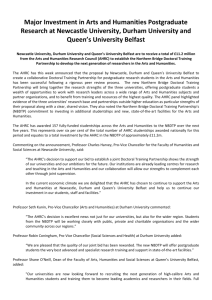Strategic Case for Support
advertisement
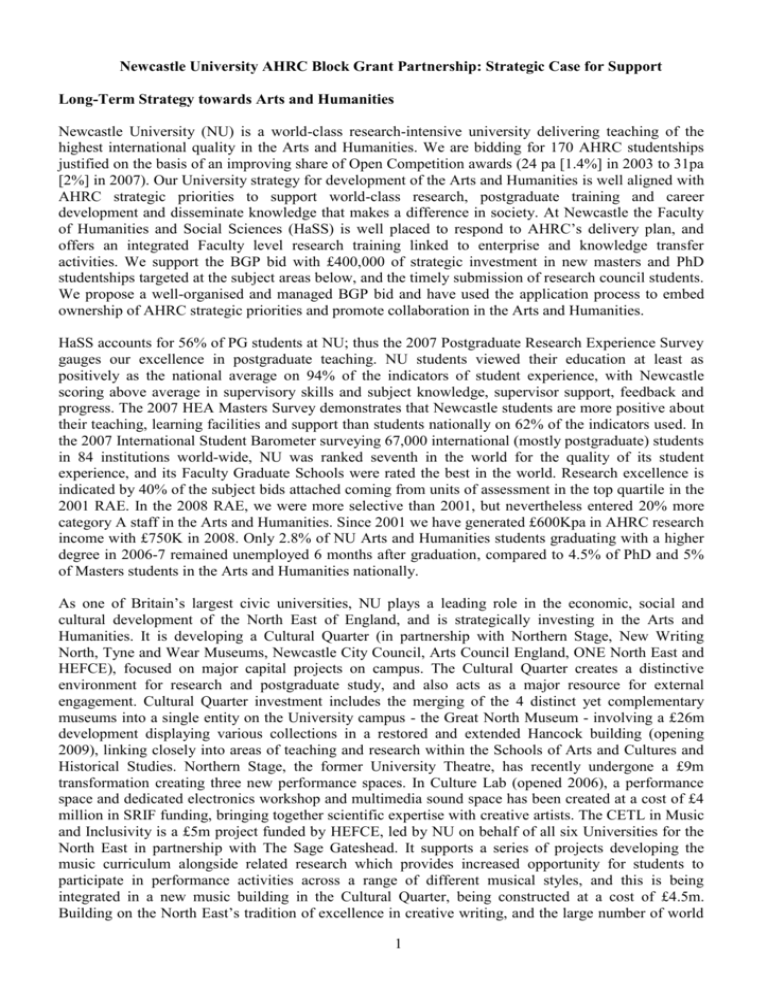
Newcastle University AHRC Block Grant Partnership: Strategic Case for Support Long-Term Strategy towards Arts and Humanities Newcastle University (NU) is a world-class research-intensive university delivering teaching of the highest international quality in the Arts and Humanities. We are bidding for 170 AHRC studentships justified on the basis of an improving share of Open Competition awards (24 pa [1.4%] in 2003 to 31pa [2%] in 2007). Our University strategy for development of the Arts and Humanities is well aligned with AHRC strategic priorities to support world-class research, postgraduate training and career development and disseminate knowledge that makes a difference in society. At Newcastle the Faculty of Humanities and Social Sciences (HaSS) is well placed to respond to AHRC’s delivery plan, and offers an integrated Faculty level research training linked to enterprise and knowledge transfer activities. We support the BGP bid with £400,000 of strategic investment in new masters and PhD studentships targeted at the subject areas below, and the timely submission of research council students. We propose a well-organised and managed BGP bid and have used the application process to embed ownership of AHRC strategic priorities and promote collaboration in the Arts and Humanities. HaSS accounts for 56% of PG students at NU; thus the 2007 Postgraduate Research Experience Survey gauges our excellence in postgraduate teaching. NU students viewed their education at least as positively as the national average on 94% of the indicators of student experience, with Newcastle scoring above average in supervisory skills and subject knowledge, supervisor support, feedback and progress. The 2007 HEA Masters Survey demonstrates that Newcastle students are more positive about their teaching, learning facilities and support than students nationally on 62% of the indicators used. In the 2007 International Student Barometer surveying 67,000 international (mostly postgraduate) students in 84 institutions world-wide, NU was ranked seventh in the world for the quality of its student experience, and its Faculty Graduate Schools were rated the best in the world. Research excellence is indicated by 40% of the subject bids attached coming from units of assessment in the top quartile in the 2001 RAE. In the 2008 RAE, we were more selective than 2001, but nevertheless entered 20% more category A staff in the Arts and Humanities. Since 2001 we have generated £600Kpa in AHRC research income with £750K in 2008. Only 2.8% of NU Arts and Humanities students graduating with a higher degree in 2006-7 remained unemployed 6 months after graduation, compared to 4.5% of PhD and 5% of Masters students in the Arts and Humanities nationally. As one of Britain’s largest civic universities, NU plays a leading role in the economic, social and cultural development of the North East of England, and is strategically investing in the Arts and Humanities. It is developing a Cultural Quarter (in partnership with Northern Stage, New Writing North, Tyne and Wear Museums, Newcastle City Council, Arts Council England, ONE North East and HEFCE), focused on major capital projects on campus. The Cultural Quarter creates a distinctive environment for research and postgraduate study, and also acts as a major resource for external engagement. Cultural Quarter investment includes the merging of the 4 distinct yet complementary museums into a single entity on the University campus - the Great North Museum - involving a £26m development displaying various collections in a restored and extended Hancock building (opening 2009), linking closely into areas of teaching and research within the Schools of Arts and Cultures and Historical Studies. Northern Stage, the former University Theatre, has recently undergone a £9m transformation creating three new performance spaces. In Culture Lab (opened 2006), a performance space and dedicated electronics workshop and multimedia sound space has been created at a cost of £4 million in SRIF funding, bringing together scientific expertise with creative artists. The CETL in Music and Inclusivity is a £5m project funded by HEFCE, led by NU on behalf of all six Universities for the North East in partnership with The Sage Gateshead. It supports a series of projects developing the music curriculum alongside related research which provides increased opportunity for students to participate in performance activities across a range of different musical styles, and this is being integrated in a new music building in the Cultural Quarter, being constructed at a cost of £4.5m. Building on the North East’s tradition of excellence in creative writing, and the large number of world 1 class writers in the region (Pat Barker, Anne Stevenson, Tony Harrison) the School of English Literature, Language and Linguistics has initiated a partnership with New Writing North, the regional development agency for literature, to form The Northern Writers’ Centre, which provides opportunities for creative writing through high quality events and projects. Currently based in Culture Lab, the Northern Writers’ Centre will move to a £5.5m custom-built space in a renovated Claremont Buildings. HaSS, the home of most AHRC-related research and teaching, is research-led with a strong tradition of scholarship, teaching and learning. Arts and Humanities staff, predominantly based in the Schools of Arts and Cultures, English Literature, Language and Linguistics, Modern Languages and Historical Studies, as the bid shows, value innovation and creativity. There are additional clusters of Arts and Humanities staff in Education, Communication and Language Sciences, Architecture Planning and Landscape, Law and Geography Politics and Sociology. All staff are international in perspective and strongly committed to the belief that we have a cultural and social obligation to the region and the world. The Faculty is inclusive and embraces diversity, and has a strong commitment to the delivery of professional pre- and post-experience education. It aims to maintain a broad base of research and teaching across the Arts, Humanities, as well as, increasingly, connecting these areas and the sciences through interdisciplinary research institutes. Promoting our strengths in developing further key areas of national and international importance, and maximizing the social, economic and cultural impact of our research and teaching is a key element of the University’s mission statement. In pursuit of this strategy, we have made significant investments in subject areas which map directly onto the AHRC’s strategic priorities. To facilitate the university's mission to promote interdisciplinary research support has also been provided to several large arts-based research centres: Northern Centre for the History of Medicine (joint with Durham University); Centre for Gender and Women’s Studies; and the recently established Centre for Research in Linguistics and Language Sciences (CRiLLS). There are also a number of smaller interdisciplinary groups: Americas, Childhood Cultures, Postcolonial Studies, Early Modern Studies, Film and Media, and Popular Music. The Faculty has also established Culture Lab, as a seedbed for research across the arts and sciences, supporting innovative AHRC-funded postgraduate projects in Music, Fine Art, English and Law. We are also concerned to maintain a vibrant external outlook, and recently launched a visiting Fellowships and Professorships programme. Finally, our strategy is to provide tailored support for postgraduate and research bids to the Research Councils. Close monitoring, internal peer review and incentivisation have led to an improvement in the AHRC success rate from 14% of research applications in 2005 to 50% in 2007, contributing to what Research Fortnight called Newcastle’s ‘startling success’ (12 Sept. 2007, p.18). Since 2001 we have been awarded 22 large AHRC grants (more than £50,000), and 13 collaborative/project PhDs, contributing to a dynamic, focused and forward-thinking research environment. Justification for the Distribution of Awards The distribution of AHRC studentships at Newcastle is justified on the basis of investing in our existing strengths, prioritising carefully selected areas for new strategic investment and identifying capacity we wish to preserve, in line with AHRCs strategic priorities. Investing in Established Strengths English Literature and Creative Writing (AHRC priority: stimulating innovation in the knowledge economy; international collaboration; Awards 2003-07 MA 13 / PhD 22; Bid 09-13 MA 15 / PhD 29): English, one of the faculty’s most successful Schools (RAE 2001 5A), has an outstanding record of achievement in recruiting postgraduate students and attracting AHRC awards in open competition. It has enjoyed success twice in the AHRC Collaborative Doctoral Award competition in the field of children’s literature. It is part of the AHRC Interdisciplinary Research Training Network co-ordinated by the Centre for Research in the Arts, Social Sciences and Humanities at Cambridge. Staff share strengths in period-based areas of literature with a strong emphasis on historical approaches and editing. The School has been awarded or contributes to AHRC large grants for editing work on Herrick, Shelley, Skaldic poetry of the Middle Ages, and leads a project to create a database of Tudor Literature. 2 Staff are at the forefront of critical work in newer areas: postcolonial literatures (AHRC Diasporas scheme award) children’s literature, film and digital media, theatre studies and creative writing. Staff research is innovative in its understanding of interdisciplinary and cross-period approaches to memory, trauma and colonialism/postcolonialism and this is reflected in postgraduate programmes like the MA in Literary Studies: Literature, Memory and Culture. Researchers are committed to developing new partnerships, regionally, nationally, and internationally eg the Children’s Literature Unit and Seven Stories, an internationally important centre and archive for the children's book based in Newcastle. The School is also developing expertise in rehearsal studies in collaboration with Live Theatre (Newcastle), the West Yorkshire Playhouse and the National Theatre. The school has one of the largest groups of creative writers in the UK with eight practitioners, three of whom are Professors (W.N.Herbert, Jackie Kay and Sean O’Brien) and one of whom is an RCUK Academic Fellow. A significant new development is The Northern Writers’ Centre, which enables collaborative working with New Writing North, and brings international writers to the region. The Northern Writers’ Centre will be housed in purpose-built accommodation in 2010 and aims to generate innovative new research in creative writing, enhance the experience of postgraduate students, coordinate opportunities for knowledge transfer and promote public dissemination of creative and academic work. Two literary festivals this year, South Asian and African, drawing on the expertise of postcolonial researchers, are inspiring examples of this work. Music (AHRC priority: capitalizing on the UK’s cultural assets; stimulating innovation in the knowledge economy; Awards 2003-07 MA 11 / PhD 9; Bid 09-13 MA 11 / PhD 13): The International Centre for Music Studies (ICMuS) scored 5*A in the 2001 RAE and is the lead partner in a Centre for Excellence in Teaching and Learning, in close partnership with The Sage Gateshead, an internationally recognised concert and education venue; ICMuS is also editorial home to the online journal Radical Musicology. In addition to developing strong synergies with Culture Lab, which currently hosts six AHRC-funded music PhD students, the university in 2006 invested heavily in ICMuS’s research and PG teaching facilities, opening a new suite of recording studios and postgraduate teaching spaces. Work has begun on a new £4.5m building, including 2 large state of the art electro-acoustic studios and a suite of instrumental teaching rooms. In addition the university has also supported increased staffing; music has grown from 7 to 16 staff 1997-2008. Music at NU, as one of the ten largest units in the UK, is able to cover a wide range of repertories and disciplines within cultural musicology and creative practice. Over the next 5 years we will invest in these two areas of research strengths: in musicology, we will develop MA degrees in World Popular Musics, Early Music, Music and Cultural Theory to accompany a new MA in Music and Education; in creative practice, we will develop MMus degrees in Composition and Performance.. ICMuS is also home to the distinctive Folk and Traditional Music degree, taught in conjunction with Folkworks, whose staff and graduate students provide a major research focus. In composition, the ICMuS Hub offers a web-based resource designed to strengthen collaborations and promote creative practice research. Museums, Galleries and Heritage (AHRC priority: capitalizing on the UK’s cultural assets; Awards 2003-07 MA 23 / PhD 9; Bid 09-13 MA 25 / PhD 12): The International Centre for Cultural and Heritage Studies (ICCHS) specialises in research and postgraduate programmes in museum, gallery, and heritage studies. ICCHS has a well-established academic reputation within the cultural heritage sector, and a wealth of experience of delivering high-quality postgraduate programmes at masters and research level. Since 2003, the ‘Museums’ subject area has gained the largest number of AHRC Open Competition studentships in NU, with three Collaborative Doctoral Awards. In 2008, ICCHS was a successful co-applicant for two AHRC doctoral collaborative training awards. In recent years, it has seen both its masters and its research student community flourish to the point where ICCHS is now one of the UK’s largest and best-known campus-based providers. ICCHS offers a stimulating and internationally diverse environment for students wishing to specialise in cultural heritage. It is extremely well-connected regionally, nationally and internationally and its staff 3 has extensive experience of working in the sector. Postgraduate programmes engage closely with professionals in English Heritage, the National Trust, and a range of museums, especially Tyne and Wear Museums. There are also strong links between staff working in the area of museums, galleries, heritage, fine art, and particularly, digital media. Digital heritage is an emerging strategic priority and it already has one Collaborative Doctoral Award with Tyne and Wear Museums on museums and the web. ICCHS has links with staff in archaeology, and architecture around sense of place, landscape, and identity. ICCHS’s research strengths resonate with sectoral priorities including: interpreting heritage for new audiences; sustainable tourism; communities and identities; social inclusion; and learning. This contributes towards AHRC’s goal of enabling the UK to capitalize on its cultural heritage assets. Fine Art (AHRC Priority: Stimulating innovation in the knowledge economy; capitalizing on the UK’s cultural assets; Awards 2003-07 MA 15 / PhD 4; Bid 09-13 MA 15 /PhD 7): Fine Art is a key strand in our work in the creative industries which impacts at the regional, national and international level. At NU, Fine Art is distinctive for a strong tradition of integrating a broad range of practice-based researchers with a group of Art Historians. Increasingly, we are investing in work that intersects with research in digital media and curating. PhD and taught masters students work alongside a team of internationally leading researchers which has included, over recent years, five AHRC funded Fellows in the Creative and Performing Arts, the Baltic Professor of Fine Art, an innovative post initiated and cofunded with the Baltic Centre for Contemporary Art as well as visiting artists based in the School’s studios. Our emphasis on building bridges to professional practice in the visual arts is underpinned by our ‘Life-Work-Art’ programme which attracted a major HEFCE FDTL grant. We have developed new models of interdisciplinary and collaborative practice: recent projects include embedding an artist with the Newcastle Institute for Ageing and Health (working alongside researchers on memory loss) and, in Culture Lab, a project developed in conjunction with researchers in our Informatics Institute using cutting edge eye tracking technology. History (AHRC priority: global threats to security; international collaboration; Awards 2003-07 MA 1 / PhD 6; Bid 09-13 MA 2 / PhD 8): Our research strengths encompass British, European, American and Asian history as well as the history of medicine. A recently secured Sasakawa Foundation-funded post in Japanese history (the only History lectureship sponsored by the Foundation) complements the provision of Chinese history, both of which find obvious echoes in the AHRC’s Language-Based Area Studies Initiative. Thematically, we have substantial expertise in the history of gender and class, demography, nationalism and fascism, regional history and the study of ethnicities, religious conflicts, consumption and intellectual and social revolutions. Many colleagues have interests directly linking to the AHRC Religion and Society programme. Newcastle is a partner in the multi-university North East England History Institute, formerly an AHRC–funded Centre (2000-2005) and is also involved in other funded collaborative research groups, notably the ‘Pauper Biographies’ project (related closely to the recent AHRC Stages of Life Initiative and the New Dynamics of Ageing Programme) with Birmingham University (funded by ESRC and the Welcome Trust) and the AHRC-funded research project ‘Bombing, States and People in Western Europe, 1940-1945’. The Wellcome-funded Northern Centre for the History of Medicine provides opportunities for interdisciplinary work with colleagues in Durham University and other interdisciplinary work will sit within Newcastle’s proposed Confucius Institute. Overall, our research strengths have informed Master’s provision in History, enabling us to grow our postgraduate research community, particularly via the highly successful MA in British History and MA in the History of Medicine. Supporting New Investment Digital Media (AHRC priorities: digital economy; stimulating innovation in the knowledge economy; Awards 2003-07 MA 1 / PhD 1 in Cultural Studies; Bid 09-13 MA 2 / PhD 2: Digital Media is embedded in our School of Arts and Cultures, and linked to Architecture, Law, English, and Modern Languages. We have developed a practice-based interdisciplinary research agenda where Fine Art intersects with Performance Technologies, Heritage Studies and Computing Science. This is based on long-term investment in new infrastructure and posts, including a new professor of Digital Media, new 4 lecturers and research fellows including Early Career Researchers, upcoming senior posts in film studies and film practice, and the Director of Culture Lab. Culture Lab has built up research collaborations across areas of digital imagery and sound, motion capture and mobile media to foster new forms of creative practice where culture informs and drives physical, and social computing technology. The new Digital Media MRes (2008) is a project intensive postgraduate programme preparing students for doctoral research and employment in the creative industries. Culture Lab and Digital Media together open up new areas at the interface of art and science in partnership with cultural organisations in the region, linking theory, creative practice, and digital technology. Linguistics and Language Sciences (AHRC priorities: international collaboration; Awards 2003-07 MA 2 / PhD 0; Bid 09-13 MA 4 / PhD 4): CRILLS was established in 2007 as a beacon of excellence for the largest group of linguistics researchers in the UK. It consolidates a strategic decision in 2004 to transfer Religious Studies (1 MA 03-07) from Newcastle to Durham and Linguistics at Durham to Newcastle, and to invest in key appointments, more than doubling the number of linguistics specialists. For the first time, there was a joint RAE submission to the linguistics panel in 2008. The Centre coordinates research across three Schools, and draws on the critical mass of supervisors to create an integrated postgraduate community, with its own state of the art facilities. NU research includes speech and language therapy, applied linguistics and second-language acquisition, and socio and theoretical linguistics. We have a very strong track record of funding from a wide range of sources, including AHRC (Holmberg, 2007-10, Structure and Linearization in Disharmonic Word Orders; Korrigan, 2001-5 A Linguistic Time-Capsule: The Newcastle Electronic Corpus of Tyneside English; Myles, 2005-8, The structure of French interlanguage: a corpus-based study). The breadth and depth of specialisms facilitates fruitful collaboration within linguistics strands and with other disciplines, however, this bid only involves aspects of linguistics covered by the AHRC. Investment in Shortage Subjects and Cross-Cutting Priorities Smaller subjects where we wish to maintain the health of Arts and Humanities disciplines by preserving areas of NU strength, often in AHRC designated shortage subjects, or interdisciplinary areas building bridges with Social Science, following AHRC’s Delivery Plan include: Modern Languages (AHRC priorities: health of disciplines; international collaboration; Awards 2003-07 MA 1 / PhD 1; Bid 09-13 MA 3 / PhD 3): NU is making subject bids in Iberian and Latin America studies and Interpreting and Translation in recognition of HEFCE’s designation of Modern Languages as “strategic” and “vulnerable”. It supported the School of Modern Languages (SML) in its successful bid to be the lead institution for the North East’s Routes into Languages programme (2007-10, funded by HEFCE and DCSF), and, in conjunction with Northumbria University and Newcastle City Council, is leading a proposal to establish a Confucius Institute (2009). The SML is a highly integrated School comprising five language sections: East Asian; French; German; Spanish, Portuguese and Latin American; and Translation and Interpreting. Research focuses on six Fields of Study (Cultural Studies, Film Media and Visual Arts, History Politics and Society, Linguistics, Literary Studies, Translation and Interpreting Studies), creating a wealth of cross-linguistic and cross-cultural synergies across the School and Faculty (eg Americas Research Group, Centre for Gender and Women Studies, Centre for Research in Linguistics and Language Sciences, Developing Areas Research Network, Early Modern Studies Group, Film and Media Research Group). The Faculty ensures teaching and research is supported by facilities in the vanguard of national provision (eg Open Access Centre for self-directed learning, the interpreting suite, and digital language labs). Archaeology (AHRC priority: capitalizing on the UK’s cultural assets; Awards 2003-07 MA 1 / PhD 2; Bid 09-13 MA 2 / PhD 3): With six new academic appointments (one professorial), supported by the University’s £26m Great North Museum project and the creation of a new Centre for Interdisciplinary Artifact Studies (CIAS) (£200K investment over 2 years), Archaeology at Newcastle has undergone a transformation in the last four years. This directly addresses AHRC research priorities; staff and postgraduate research strongly emphasise work alongside heritage professionals on care of the historic 5 environment. CIAS research and training addresses shortages in artifact skills repeatedly noted by the AHRC. Both CIAS and the GNM will facilitate cutting-edge collaborative research and knowledge transfer bridging the arts and sciences. Political Philosophy (AHRC priority: global threats to security; living with environmental change; Awards 2003-07 MA 0 / PhD 1 in Cultural Studies; Bid 09-13 MA 0 / PhD 3): Political Philosophy is an important bridge between the humanities and social sciences and has an excellent international reputation with research strengths in liberal, international and environmental political philosophy and ethics (funded by AHRC, Leverhulme, British Academy and Atlantic Philanthropies). Four NU PhD students have won a PSA prize and we have an AHRC project studentship. Political philosophers lead the interdisciplinary ‘Newcastle Ethics, Legal and Political Philosophy’ group. In 2008-9, a new MA in ‘Global Justice and Ethics’ will further strengthen the postgraduate community. Classics and Ancient History (AHRC priority: international collaboration; Awards 2003-07 MA 0 / PhD 1; Bid 09-13 MA 1 / PhD 1): The subject offers an attractive combination of research strengths and facilities. Staffing has increased from 9 to 11, and £1.3m in research funding raised since 2001. It is supported by investment in the Great North Museum and Centre for Interdisciplinary Artefact Studies. Collaboration with History of Medicine and restructured Masters teaching enhance its appeal. History of Art, Architecture and Design (AHRC Priority: living with environmental change; Awards 2003-07 MA/PhD 0; Bid 09-13 MA 0 / PhD 3): Investments in staff (5 out of the 11 staff were appointed after 2001) and funding for 2 PhD studentships have been made in recent years. Scholars in the history of architecture and building and landscape design link with cultural and heritage studies and digital media. AHRC research and collaborative studentship funding has been secured. BGP studentships will support research and help develop UK capacity in this area, building on excellent facilities, a stimulating research environment, and robust research training. Law (AHRC priority: living with environmental change; global threats to security; Awards 2003-07 MA/PhD 0; Bid 09-13 MA 0 / PhD 2: Law was awarded an AHRC project studentship in 2007-8, and is well placed to support further awards. Graded 5 in the 2001 RAE, it has a student-friendly ethos (ranked 1st of Russell Group law schools in the International Student Barometer, 2008). Investment in new staff (11 out of 24 staff have been appointed since 2001, including 3 professors) means supervision is offered in a wide range of UK, international and comparative areas by internationally renowned researchers. There is a dedicated law library with significant new investment. BGP scholarships will strengthen UK capacity in this area. Method for Calculating the Spread of Studentships NU established a Steering Group to develop its BGP bid, chaired by the HaSS Postgraduate Dean and including representation from all subject areas. At Stage 1 the Steering Group drafted the Case for Support, in the light of AHRC’s strategic priorities, drawing on University policy, and liaising with senior University management. Stage 2: the Steering Group calculated at subject level NU’s national share of open competition/collaborative/ project awards. Stage 3: the Steering Group conducted a BGP dissemination event for all staff in the Faculty, and an internal competition for subject areas wishing to apply to AHRC. Previous award data was used to evaluate individual subject bids by calculating the expected number of Newcastle studentships 2009-13 given our historic market share and AHRC’s predicted future awards. Additional subject bids were commissioned in areas of strategic investment identified in the University and Faculty strategies outlined at Stage 1. Stage 4: the Steering Group reviewed subject bids and adjusted the Case for Support in the light of those selected. This process built ownership of the institutional strategy for the Arts and Humanities by concentrating on selected areas of existing and future strength and expansion into significant concentrations of excellence with critical mass; promoting research groupings in the search for fruitful interdisciplinary collaborations and building commitment to wider social and cultural engagement. 6
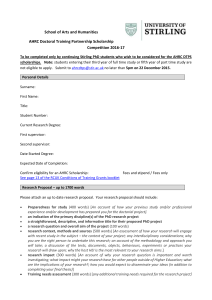

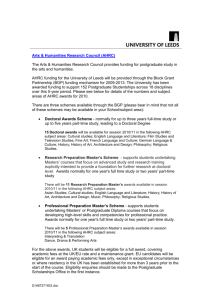
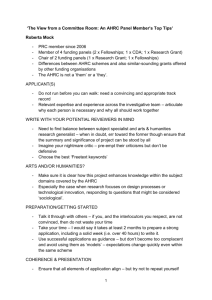
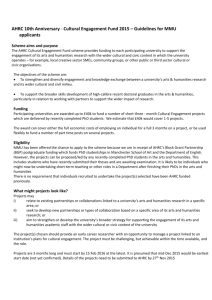
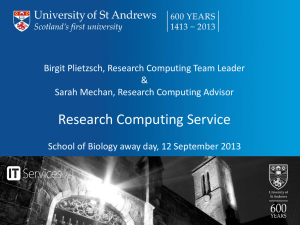
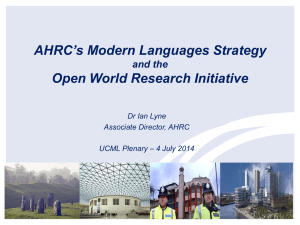
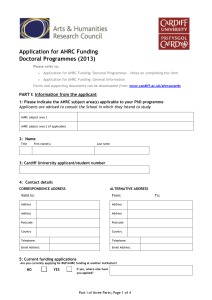
![Form GAO/F1 Application Form for Graduate Study [JLB]](http://s3.studylib.net/store/data/005850957_1-64391b9fbf6f3c7624c50916525352c4-300x300.png)
